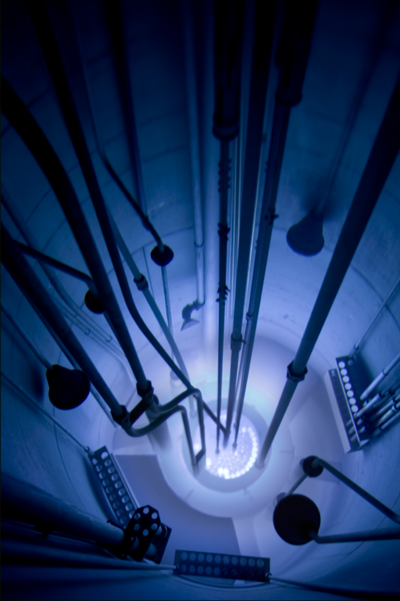
The OSTR is a water-cooled, pool-type research reactor that uses uranium/zirconium hydride fuel elements in a circular grid array.
The reactor is licensed by the USNRC to operate at a maximum steady state power of 1.1 MW and can also be pulsed up to a peak power of about 2000 MW. The most important responsibility of the OSTR is to support Oregon State University’s academic programs. Instructional use of the reactor is twofold. First, it is used significantly for classes in nuclear engineering, radiation health physics, and chemistry at both the graduate and undergraduate levels to demonstrate numerous principles that have been presented in the classroom. Second, shorter-term demonstration experiments are also performed for many undergraduate students in physics, chemistry and biology classes as well as for visitors from other universities, colleges, high schools and civic groups.
The OSTR is a unique and valuable tool for a wide variety of research applications, and serves as an excellent source of neutrons and/or gamma irradiations. The OSTR has a number of irradiation facilities providing a wide range of neutron flux levels and neutron flux qualities, which are sufficient to meet the needs of most researchers. The most common OSTR irradiation facilities and their typical uses include:
Rotating Rack (Lazy Susan) - Neutron Activation Analysis
Pneumatic Transfer Tube (Rabbit) - Neutron Activation Analysis
Thermal Column (TC) - Fission Track
In-Core Irradiation Tube (ICIT) - Ar/Ar (Geochronology), isotope production, radiation hardness testing
Cadmium-Lined In-Core Irradiation Tube (CLICIT) - Ar/Ar (Geochronology), 1-MeV equivalent neutron damage
Prompt Gamma Neutron Activation Analysis (PGNAA) - neutron activation analysis
Neutron Radiography Facility (NRF) - Neutron radiography, instrumentation testing, radiation hardness testing
Operating Statistics for 2011-2012
Thermal Energy Produced 53.5 MWD
Time Reactor was Critical 1381 hours
Time Reactor at full power 1279 hours
Number of Irradiation Requests 279
Number of Samples 1116